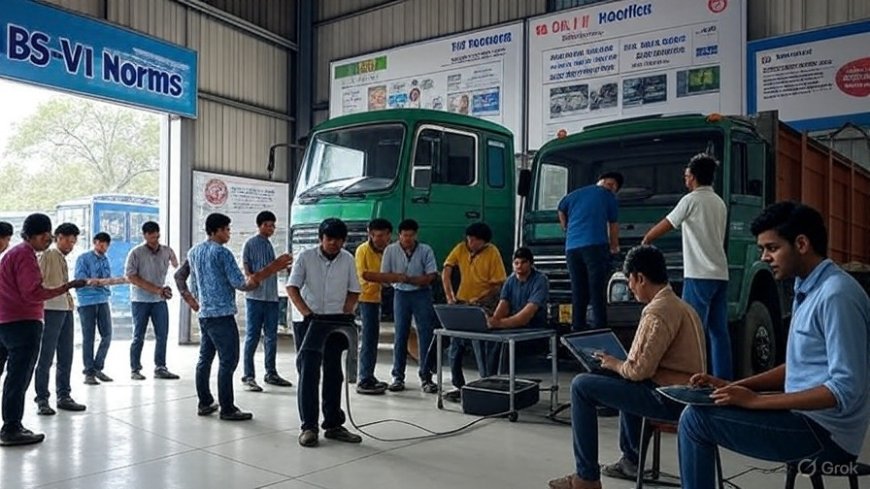Retrofitting the Future: How Delhi’s BS-VI Challenge Is Cleaning Truck Pollution and Fueling Green Innovation
Delhi’s BS-VI retrofit challenge is transforming old trucks into clean-tech carriers through government incentives, youth innovation, and startup collaboration, aligning with India’s 2030 emission targets.

As the national capital continues to battle hazardous air pollution, especially from commercial diesel vehicles, the Delhi government has launched a bold initiative: the BS-VI Retrofit Challenge. This ambitious program seeks to upgrade over 300,000 BS-IV and older diesel trucks to meet Bharat Stage VI (BS-VI) norms by 2028 — without replacing the fleet.
This is not just a vehicle upgrade. It’s a complete ecosystem overhaul involving public policy, youth-driven innovation, startup incubation, and green tech deployment, transforming the grim landscape of vehicular emissions into a story of hope, investment, and long-term sustainability.
Why Retrofit, Why Now?
Over 36% of Delhi’s particulate matter emissions are attributed to heavy commercial vehicles, despite forming only 4% of the city’s total traffic, according to a recent report by the Centre for Science and Environment.
With the ban on BS-III and BS-IV diesel trucks looming and full fleet replacement proving economically unviable for small transporters, retrofitting emerges as a feasible, affordable, and scalable solution.
"Replacing every truck would cost over ₹4.5 lakh crore. Retrofitting offers a ₹75,000 to ₹1.5 lakh solution per vehicle, cutting 60–80% of key emissions," said Saurabh Bhardwaj, Delhi’s Transport Minister.
What Is the BS-VI Retrofit Challenge?
Launched in April 2025, the BS-VI Retrofit Challenge is a state-supported competition and subsidy program inviting startups, auto manufacturers, college innovators, and fleet operators to design, test, and scale viable retrofitting kits for BS-IV diesel trucks.
The Program Offers:
-
₹50 crore innovation fund for pilot projects and field deployment
-
Subsidies up to 60% on approved retrofit kits for small fleet owners
-
Certification fast-tracking by Automotive Research Association of India (ARAI)
-
Green financing options from Delhi State Cooperative Bank
Inside the Innovation Ecosystem
The innovation push is happening on multiple fronts, involving diverse actors working in sync:
1. Youth Innovation Hubs
Over 120 student teams from institutions like IIT Delhi, Jamia Millia Islamia, and NSUT are competing to design cost-efficient catalytic converters, dual-fuel systems, and advanced DPF (diesel particulate filter) kits.
-
IIT Delhi’s ‘Project RAKSHAK’ has already prototyped a retrofit solution reducing NOx emissions by 75% while boosting mileage.
-
NSUT’s all-women robotics team has created a machine-learning sensor unit to regulate emissions in real-time.
“It’s rare for students to work on real urban problems this early. We’re building hardware that can change lives,” said Arushi Malhotra, a final-year mechanical engineering student.
2. Startup Incubation and Collaborations
Clean-tech startups such as PiGreen Innovations, Carbon Craft, and ReviveEV Mobility have partnered with Delhi Transport Department under the Retrofit Challenge accelerator.
-
PiGreen Innovations, already known for its hybrid conversion kits for autorickshaws, is now testing modular BS-VI compliant systems for 3-ton trucks.
-
Carbon Craft, which recently raised funding from BlueOrchard Finance, is leading the pilot on circular carbon capture using ceramic filters.
Government Support and Policy Backbone
The Delhi government is leveraging a multi-departmental coordination model to ensure seamless implementation.
Key Initiatives:
-
Incentives & Rebates:
Transporters can get up to ₹90,000 in retrofitting subsidies if their trucks are converted by certified vendors. -
Inspection & Certification:
15 mobile testing units across Delhi NCR have been deployed to test emission compliance of retrofitted vehicles. -
Green Tags & Road Priority:
Retrofitted trucks receive a Green Tag, enabling priority entry during smog season, when other commercial vehicles face restrictions. -
Integration with NCR States:
Haryana, UP, and Rajasthan are exploring joining the retrofit ecosystem under the NCR Air Quality Commission.
The Challenge of Retrofitting: Cost, Compatibility & Trust
Despite growing enthusiasm, challenges remain:
-
Compatibility concerns: Some BS-III vehicles may not structurally support modern filters or dual-fuel conversions.
-
Cost doubts: Even with subsidies, truckers worry about downtime and future maintenance costs.
-
Awareness gap: Many fleet operators in Ghazipur, Najafgarh, and Okhla industrial belts are still unaware of the program.
However, awareness camps, multilingual guides, and vendor demonstrations are being actively rolled out to bridge this gap.
Success Stories on the Ground
In a pilot run across Bawana Industrial Area, 120 trucks were retrofitted by Carbon Craft. Within three months:
-
Diesel consumption reduced by 8–10%
-
PM2.5 emissions dropped by 63%
-
Drivers reported fewer engine breakdowns
Rampratap Singh, a truck owner, said,
“I was skeptical. But the retrofit worked better than expected. Pollution check passed easily, and mileage is better now.”
The Broader Impact: A Blueprint for India?
While Delhi leads, the retrofit challenge could soon be adopted across pollution-hit metro regions like Mumbai, Chennai, and Lucknow. In fact, the Ministry of Heavy Industries is closely monitoring Delhi’s model as a pilot for national retrofit policy, expected in 2026.
According to NITI Aayog's 2024 report on clean freight, retrofitting could cut 40 million tons of CO₂ by 2030 if implemented at scale.
“We need to think beyond EVs alone. Retrofit bridges the gap, especially for India’s massive used vehicle base,” said Dr. Sharad Sharma, an advisor to MoRTH.
Private Sector Joins In
Several commercial giants are participating in Delhi’s retrofit drive:
-
Tata Motors and Ashok Leyland have opened retrofit service outlets at key transport hubs.
-
BPCL is offering discounts on green diesel to retrofitted trucks.
-
Uber Freight has announced that by 2027, all partner trucks in Delhi will be BS-VI compliant — retrofitted or electric.
Conclusion: A Clean Path Through Innovation
The BS-VI Retrofit Challenge represents a rare convergence of policy clarity, grassroots innovation, and youth empowerment. Rather than scrap and replace, Delhi is showing how a city can innovate its way through complexity, reduce emissions, and empower livelihoods.
As other cities look for answers to their growing pollution problem, Delhi’s retrofit challenge may just become a national model of green transition, driven by students, supported by science, and backed by smart governance.

















































